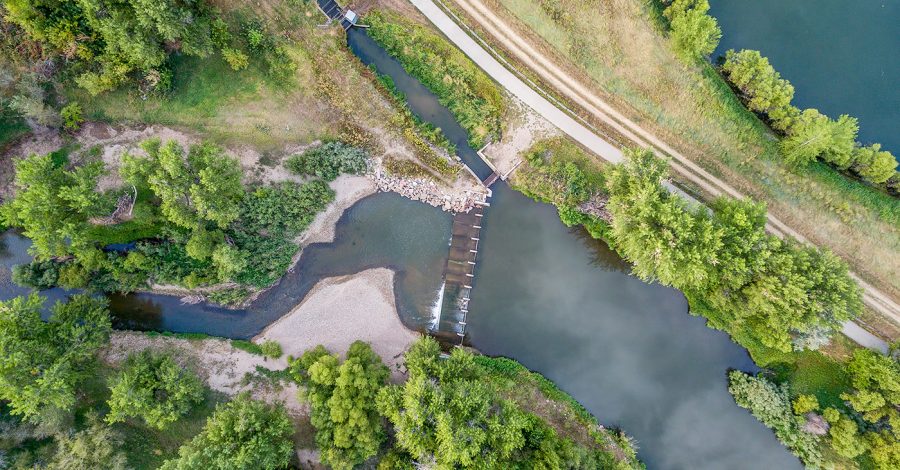August 8, 2023

Valuing water rights transactions: Not all water is equal
As a firm specializing in water right appraisals, we receive a lot of calls from landowners and brokers who see water rights attached to a property and want to know what the water is worth. Unlike other real property, sales of water rights are often not recorded, and there is no public database of water rights transactions. Finding comparable sales can be difficult, and we frequently see water rights holders default to equating the value of their water rights with more actively and publicly traded water assets, such as contract units of the Colorado-Big Thompson Project. More often than not, this is a false comparison, as each water right has unique characteristics that influence value. Some of the most common questions we ask to better understand value include the following:
• Is the water right transferrable? Water rights that can be severed from and sold separately from land typically trade at a premium compared to water rights that must remain with the land. Nearly two-thirds of all water rights transacted in Colorado are purchased by municipal water utilities, developers and homebuilders. Developers and homebuilders seek water rights to dedicate to municipal utilities in return for water taps. These buyers target water rights that can be transferred from the land it historically irrigated to a municipal water system. In most cases, when water is severed from the land, the land can no longer be irrigated by the same water source – it must be “dried up.” To change the use of water in Colorado, such as from agricultural to municipal use, water right owners must secure judicial approval from Water Court. Water Court processes are lengthy and costly, and municipal buyers are inclined to pay more for water rights that have a proven track record of judicial approvals. Water rights that have not been previously changed are commonly viewed as an unknown quantity and are traded at a discount.
• How reliable is the water right? Colorado allocates water based on the prior appropriation system, frequently summarized as “first in time, first in right.” Water rights are administered by seniority – senior water rights may divert from a river longer and more reliably during droughts than junior rights. Consequently, senior water rights are usually valued at a premium. What constitutes “senior” and “junior” varies by geographic region and the source of the water. Some water rights, while technically junior, are delivered from reservoirs or trans-basin diversions that offer high reliability. People often point to the seniority of a water right as the No. 1 attribute influencing value. Our experience is that it is only important to the extent that it influences reliability of the water supply and often is a secondary consideration.
• Is the water right marketable? Water acquisition by municipal water utilities is the single-largest market driver in Colorado. Water rights that are located near municipalities or that can be easily delivered to their water supply system are normally priced higher than water rights located far away. Along the Front Range, water prices depreciate with increasing distance from population centers. Another factor in the marketability of water is the volume of the water right offered. Municipal buyers are less inclined to pay a premium for small-volume sales given the legal and regulatory requirements of transferring the water, seeking instead large-volume transactions that provide efficiency of scale. One of the first questions we ask when someone wants to know the value of their water is, “What type of water right is it?” Commonly traded water assets in Colorado include shares of irrigation ditch companies, irrigation district allotments, and various classes of groundwater rights. Each of these assets has unique factors that influence their value:
• Ditch company shares. Shares of stock in mutual ditch companies are commonly transacted in Colorado. Each share of stock affords the holder proportional ownership of the water rights owned by the ditch company. In most cases, ditch company shares are marketable, though the reliability of the ditch, its location, and potential restrictions
• Irrigation district allotments. Irrigation districts were formed with taxing authority to develop water rights and water projects to serve lands within the districts. Owners of irrigation district lands (commonly called “bonded lands”) are entitled to receive irrigation water from the district. However, bonded landowners do not own the underlying water rights, and in most all cases the water rights cannot be used outside the district or for purposes other than irrigation. Irrigation district allotments are typically not priced separately from land and trade a discount relative to ditch company shares.
• Tributary groundwater rights. We receive more questions on groundwater than any other type of water right. The state generally presumes groundwater is connected to surface water. That is, the groundwater is “tributary” to the surface, which requires administration according to priority. Since wells postdate most surface water rights, groundwater rights are relatively junior. As a result, pumping of tributary wells often requires “augmentation,” which is the replacement of water pumped from the well with substitute sources, often senior water rights or stored water. Conservancy districts and private companies have been established to provide augmentation water (or “credits”). In some cases, augmentation credits can be transacted separately from the land.
• Nontributary groundwater rights. Groundwater that is not connected to or has limited connection with the surface is classified nontributary. Nontributary groundwater rights are not regulated by priority and are granted to the overlying surface owner, though they may be segregated and sold separately from the land. The most significant class of nontributary rights is Denver Basin groundwater, found along the Front Range from Colorado Springs north to Greeley. Denver Bbasin rights must be pumped from the land overlying the groundwater but can be exported off-site. Prices for Denver Basin groundwater depend on their location and volume, but generally transact at a significant discount to surface water rights.
• Exempt wells. Exempt wells are most commonly found in rural areas that are not served by municipal water supply systems, are usable only for indoor domestic use and livestock watering, and are limited in the rate they can pump. Exempt well regulations vary depending on property acreage and location. Exempt wells have no transferable water right value, beyond the value that the wells add to the land.
Water values across Colorado have appreciated considerably in the past two decades, but for specific water assets, pricing trends are mixed. We have seen some classes of water rights balloon in value to be worth five or more times the value of the underlying land, while in other cases, the value of water has remained stagnant or even declined. With so many types of water rights and the myriad factors influencing prices, thorough due diligence can be required to understand the values. A helpful first step is to call resources such as the ditch company servicing the property, local municipalities, or the State Engineer’s Office. Large, unique or complex water right holdings may require investigation by a reputable water rights appraiser.
Article originally published in the Colorado Real Estate Journal
Authors

Regional Director, WestWater Research

President, WestWater Research